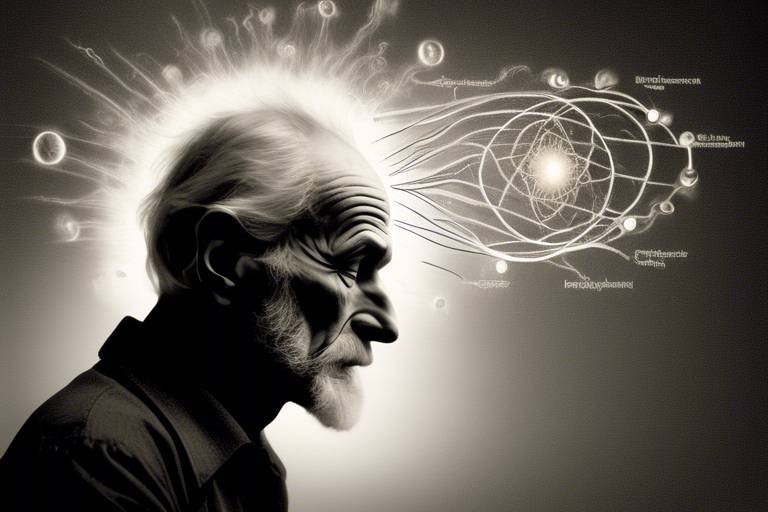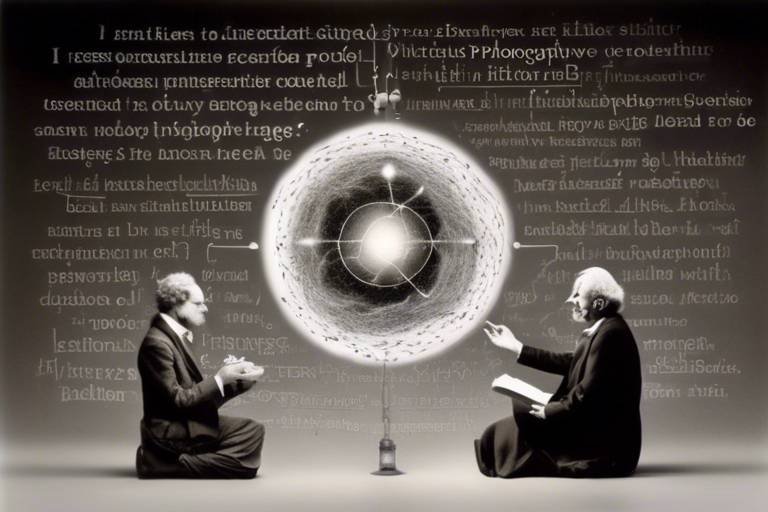How Do Scientific Revolutions Impact Philosophy?
Scientific revolutions are like seismic shifts in the landscape of human understanding. They redefine our grasp of reality and challenge the very foundations of philosophical thought. Imagine standing on solid ground, only to have it suddenly shift beneath your feet; that’s what happens when a scientific revolution occurs. These revolutions propel us into new realms of inquiry, forcing us to reconsider our assumptions about knowledge, existence, and the nature of reality itself. In this article, we will explore how these paradigm shifts in science have profound implications for philosophy, reshaping our understanding of what it means to know and exist in the universe.
To truly appreciate the impact of scientific revolutions on philosophy, we must first understand what constitutes a scientific revolution. Unlike gradual scientific progress, which builds incrementally upon existing knowledge, a scientific revolution represents a radical transformation in the way we view the world. Think of it as a sudden burst of light in a dark room, illuminating corners that were previously unseen. Historical examples, such as the Copernican and Darwinian revolutions, serve as prime illustrations of how such shifts can alter our worldview and philosophical discourse. These events not only introduced groundbreaking scientific theories but also prompted a reevaluation of fundamental philosophical concepts, leading to a cascade of new questions and ideas.
The implications of these paradigm shifts extend far beyond the realm of science. They challenge our understanding of **truth**, **knowledge**, and **reality**, forcing philosophers to grapple with the consequences of new scientific insights. For instance, when the heliocentric model replaced the geocentric view, it didn't just change astronomy; it also reshaped philosophical discussions about humanity's place in the cosmos. Suddenly, we were no longer the center of the universe, leading to profound existential questions about our significance and purpose. Similarly, the Darwinian Revolution ignited debates about evolution and morality, intertwining scientific inquiry with philosophical considerations about what it means to be human.
As we navigate through these transformative periods, it becomes clear that scientific revolutions are not isolated events; they are interconnected with philosophical thought. The dialogue between science and philosophy is dynamic, with each discipline informing and challenging the other. In contemporary times, we see this relationship evolve as modern philosophers respond to ongoing scientific advancements, particularly in fields like physics and biology. These advancements bring forth new ethical dilemmas and questions of identity, compelling philosophers to adapt their frameworks to accommodate the changing landscape of knowledge.
In conclusion, the impact of scientific revolutions on philosophy is profound and multifaceted. They serve as catalysts for change, prompting us to rethink our beliefs and assumptions about the world. As we continue to explore the boundaries of scientific understanding, we must remain open to the philosophical implications that arise, recognizing that our quest for knowledge is a shared journey between science and philosophy. Together, they illuminate the path towards a deeper understanding of existence and our place within the universe.
- What is a scientific revolution?
A scientific revolution refers to a fundamental change in the basic concepts and experimental practices of a scientific discipline, often leading to a new paradigm.
- How do scientific revolutions influence philosophical thought?
They challenge established beliefs, prompting philosophers to reconsider foundational concepts of knowledge, reality, and existence.
- Can you provide an example of a scientific revolution?
The Copernican Revolution is a prime example, which shifted the view of the universe from a geocentric to a heliocentric model, impacting both science and philosophy.
- What role does philosophy play in understanding scientific advancements?
Philosophy helps frame the ethical implications of scientific discoveries and provides a critical lens through which to evaluate new knowledge.

The Nature of Scientific Revolutions
Scientific revolutions are not just minor adjustments in our understanding of the world; they are monumental shifts that redefine entire fields of study. The term "scientific revolution" often brings to mind the groundbreaking discoveries that have fundamentally altered our perception of reality. Think of it as a sudden, explosive transformation in thought, much like a caterpillar emerging from its cocoon as a butterfly. These revolutions contrast sharply with the gradual accumulation of knowledge that characterizes typical scientific progress. Instead of a slow and steady evolution, scientific revolutions are marked by radical changes that challenge established norms and beliefs.
One of the most significant aspects of scientific revolutions is their ability to create new paradigms. A paradigm, in this context, refers to a framework of theories and practices that define a scientific discipline at a given time. When a scientific revolution occurs, it often leads to a paradigm shift, where the old framework is replaced by a new one that better explains the data and observations. This transition can be tumultuous, as it involves a reevaluation of previously accepted truths and can provoke intense debates within the scientific community.
Historically, some exemplary revolutions include:
- The Copernican Revolution: This revolution shifted the view of the universe from a geocentric model, where Earth was at the center, to a heliocentric model, placing the Sun at the center. This change not only transformed astronomy but also had profound implications for philosophy and our understanding of humanity's place in the cosmos.
- The Darwinian Revolution: Charles Darwin's theory of evolution introduced the idea that species evolve over time through natural selection. This notion challenged the static view of life and led to significant philosophical discussions about existence, morality, and the nature of humanity.
- The Quantum Revolution: In the 20th century, the advent of quantum mechanics revolutionized physics and our understanding of reality at the subatomic level, raising questions about determinism, observation, and the nature of reality itself.
Each of these revolutions not only advanced scientific knowledge but also prompted philosophers to rethink fundamental concepts such as truth, existence, and the nature of reality. The implications of these paradigm shifts extend far beyond the laboratory, influencing various domains of human thought and inquiry. As we delve deeper into the philosophical implications of these revolutions, we'll uncover how they have shaped our understanding of knowledge itself.
In essence, scientific revolutions act as catalysts for philosophical inquiry. They challenge us to reconsider what we know and how we know it, pushing the boundaries of human thought. As we explore the philosophical ramifications of these revolutions, it becomes clear that the interplay between science and philosophy is not merely academic; it is a dynamic relationship that shapes our very understanding of existence.

Philosophical Implications of Paradigm Shifts
The impact of paradigm shifts on philosophical discourse is nothing short of revolutionary. When a scientific revolution occurs, it often leads to a seismic shift in the foundational concepts that underlie our understanding of the world. For instance, consider how the transition from Newtonian physics to Einstein's theory of relativity forced philosophers to rethink notions of time and space. Suddenly, the once-firm boundaries of what we believed to be absolute were called into question. This is just one example of how scientific advancements can ripple through the fabric of philosophical thought.
At the heart of these paradigm shifts lies a re-evaluation of truth, knowledge, and the very nature of reality. Philosophers are often left grappling with new questions that arise from these shifts. For instance, the emergence of quantum mechanics not only challenged the deterministic view of the universe but also raised profound questions about causality and the nature of existence itself. How do we reconcile the unpredictable behavior of particles with our understanding of reality? This is where philosophy steps in, attempting to bridge the gap between scientific discovery and our conceptual frameworks.
Moreover, these shifts often lead to a rethinking of epistemology—the study of knowledge. As scientific paradigms change, so too do the methods by which we acquire and validate knowledge. The scientific method itself, once considered the gold standard for truth, has come under scrutiny. Philosophers now debate the reliability of empirical evidence in light of new findings that challenge traditional methodologies. For example, the rise of artificial intelligence and machine learning has prompted discussions about what it means to know something in an age where algorithms can predict outcomes with astonishing accuracy, yet lack human intuition.
As we delve deeper into the philosophical implications of these paradigm shifts, we can identify several key areas of inquiry:
- Reconceptualization of Knowledge: How do shifts in scientific understanding alter our criteria for what constitutes knowledge?
- Ethical Considerations: What moral responsibilities arise from new scientific capabilities, and how should philosophy guide these discussions?
- Existential Questions: How do scientific revolutions reshape our understanding of humanity's place in the universe?
In summary, the philosophical implications of paradigm shifts extend far beyond the realm of science. They challenge us to reconsider our beliefs about truth and knowledge, urging us to adapt our philosophical frameworks to accommodate new realities. As we continue to explore the intersections of science and philosophy, one thing remains clear: the dialogue between these two fields is essential for a comprehensive understanding of our world.

Case Study: Copernican Revolution
The Copernican Revolution stands as one of the most significant turning points in the history of science, not merely for its astronomical implications but for its profound philosophical consequences. Before this revolution, the prevailing belief was that the Earth was the center of the universe—a concept known as geocentrism. This view was not just a scientific hypothesis; it was intertwined with theological and philosophical beliefs that placed humanity at the center of creation. However, when Nicolas Copernicus proposed a heliocentric model, suggesting that the sun, rather than the Earth, was at the center of our solar system, it sent shockwaves through both the scientific and philosophical communities.
To understand the magnitude of this shift, we need to consider the implications it had on various aspects of thought. The transition from a geocentric to a heliocentric model prompted a reevaluation of humanity's place in the cosmos. No longer could humans see themselves as the focal point of existence; instead, they were just one of many planets orbiting a star. This change was not merely about celestial mechanics; it challenged the very foundations of metaphysics and epistemology.
In terms of metaphysics, the Copernican Revolution forced philosophers to confront new questions about existence and causality. If the Earth was not the center of the universe, what did that mean for the nature of reality? It led to debates about the nature of space and time, as thinkers began to wonder whether these concepts were absolute or relative. Copernicus's model opened the door for later philosophers, such as Galileo Galilei and Isaac Newton, to explore these ideas further, ultimately reshaping our understanding of the physical world.
Moreover, the Copernican Revolution had significant implications for epistemology. It prompted a shift in how knowledge was acquired and validated. Prior to this revolution, knowledge was often based on the authority of ancient texts and religious doctrine. However, as new astronomical evidence emerged, such as the phases of Venus observed by Galileo, it became clear that empirical observation and experimentation were essential to understanding the universe. This shift laid the groundwork for the scientific method, emphasizing the importance of evidence over tradition.
In summary, the Copernican Revolution was not just a scientific breakthrough; it was a catalyst for profound philosophical inquiry. It challenged long-held beliefs about existence, knowledge, and the nature of reality itself. As we explore the impact of scientific revolutions on philosophy, the Copernican Revolution serves as a powerful example of how shifts in scientific paradigms can reshape our understanding of the world and our place within it.

Impact on Metaphysics
The Copernican Revolution was not just a shift in the way we understood the cosmos; it was a seismic event that rocked the very foundations of metaphysical thought. Before Copernicus, the prevailing view was that the Earth was the center of the universe, a belief that not only shaped our understanding of astronomy but also influenced our philosophical perspectives on existence and humanity's role in the grand scheme of things. With the introduction of heliocentrism, where the Sun became the center of our solar system, a cascade of metaphysical inquiries emerged, challenging long-held assumptions and compelling philosophers to rethink the nature of reality itself.
One of the most profound implications of this shift was the reevaluation of causality. The geocentric model posited a certain order and purpose to the cosmos, where everything revolved around our planet. However, as the heliocentric model gained acceptance, it raised questions about the nature of causation. If the Earth was no longer the focal point, what did that mean for our understanding of cause and effect? This shift led to a more complex view of causality, suggesting that events in the universe were interconnected in ways previously unimagined. Philosophers began to ponder whether causation was merely a human construct, or if it had an objective reality independent of our observations.
Moreover, the Copernican Revolution prompted a reevaluation of space and time. In the geocentric model, space was often viewed as a static stage upon which celestial bodies played out their roles. However, with the Earth moving through space, philosophers had to grapple with the idea that space itself might be dynamic and relational rather than absolute. This realization set the stage for later thinkers like Newton and Leibniz, who would further develop these concepts, leading to a profound transformation in metaphysical thought.
Additionally, the Copernican Revolution ignited debates about the nature of existence. If humanity was no longer at the center of the universe, what did that mean for our significance? This existential crisis led philosophers to explore new frameworks for understanding human existence and our place in the universe. The shift from a human-centered cosmos to a more expansive view of the universe forced thinkers to confront uncomfortable questions about the nature of life, purpose, and the very fabric of reality.
In summary, the Copernican Revolution acted as a catalyst for an array of metaphysical inquiries that reshaped our understanding of existence, causality, and the universe itself. It challenged the notion of a static reality and opened the door to a more dynamic and complex understanding of the cosmos. This revolution did not merely alter our scientific models; it profoundly impacted the philosophical discourse, leading to a rich tapestry of ideas that continue to influence metaphysical thought today.
- What is the Copernican Revolution?
The Copernican Revolution refers to the paradigm shift from the geocentric model of the universe, which placed Earth at its center, to the heliocentric model proposed by Nicolaus Copernicus, which positions the Sun at the center of our solar system. - How did the Copernican Revolution impact philosophy?
It prompted a reevaluation of key metaphysical concepts such as existence, causality, and the nature of space and time, leading to new philosophical inquiries about humanity's place in the universe. - What are some metaphysical implications of heliocentrism?
Heliocentrism challenged the static view of the cosmos, introduced a dynamic understanding of causality, and raised existential questions about human significance in a vast universe.

Influence on Epistemology
The Copernican Revolution was not just a monumental shift in our understanding of the cosmos; it also sent shockwaves through the realm of epistemology, the study of knowledge itself. Before this revolution, the geocentric model, which placed Earth at the center of the universe, was not merely an astronomical theory; it was intertwined with the prevailing philosophical beliefs about humanity's place in the cosmos. The transition to heliocentrism forced philosophers to confront profound questions about how we acquire knowledge and what constitutes valid evidence in the pursuit of truth.
One of the most significant epistemological shifts that arose from the Copernican Revolution was the reevaluation of **empirical observation** as a cornerstone of knowledge. Prior to this period, much of what was accepted as knowledge stemmed from authoritative texts and the philosophical musings of figures like Aristotle. However, as astronomers began to gather empirical data that contradicted long-held beliefs, it became clear that knowledge could not solely rely on tradition or authority. Instead, it had to be grounded in observable phenomena, leading to a more scientific approach to understanding the universe. This shift laid the groundwork for the scientific method, emphasizing hypothesis testing and observation.
Furthermore, the Copernican model raised critical questions about the **nature of certainty** in knowledge acquisition. If the Earth was not the center of the universe, what else might be mistaken in our understanding? This uncertainty prompted philosophers to consider the limits of human perception and reason. For instance, how do we know that our senses accurately reflect reality? This philosophical inquiry paved the way for later thinkers, such as Descartes, who famously questioned the reliability of sensory experience and sought a foundation for knowledge that was indubitable.
In light of these changes, several key epistemological issues emerged that are still relevant today:
- What constitutes evidence? The Copernican Revolution highlighted the need for a robust criterion for evaluating evidence, especially when it contradicts established beliefs.
- The role of skepticism: The questioning of long-held truths encouraged a culture of skepticism, where beliefs must be scrutinized rather than accepted at face value.
- Frameworks for knowledge validation: The shift necessitated the development of systematic approaches to validate new knowledge claims, influencing the evolution of scientific inquiry.
In summary, the influence of the Copernican Revolution on epistemology was profound and far-reaching. It not only transformed the way we view the cosmos but also redefined the nature of knowledge itself. By prioritizing empirical evidence and fostering a culture of skepticism, it laid the groundwork for modern scientific inquiry and philosophical thought. The implications of this shift continue to resonate in contemporary discussions about knowledge, belief, and the nature of reality.
- What is epistemology? Epistemology is the branch of philosophy concerned with the nature, scope, and limits of knowledge.
- How did the Copernican Revolution affect philosophy? It challenged existing beliefs about humanity's place in the universe and prompted a reevaluation of how knowledge is acquired and validated.
- What is the scientific method? The scientific method is a systematic approach to inquiry that involves observation, hypothesis formulation, experimentation, and analysis.

Case Study: Darwinian Revolution
The Darwinian Revolution stands as a monumental turning point in both the biological sciences and philosophical thought. When Charles Darwin published his groundbreaking work, "On the Origin of Species," in 1859, he didn't just introduce a new theory of evolution; he ignited a firestorm of debate that would ripple through many fields of inquiry. The implications of Darwin's theory extended far beyond biology, prompting profound questions about the nature of human existence, morality, and our place in the cosmos.
At the heart of the Darwinian Revolution is the concept of natural selection, which proposes that species evolve over time through a process of variation and survival of the fittest. This idea challenged the traditional views of creation and existence, which were often rooted in religious and static interpretations of life. Instead of a divine plan, Darwin offered a dynamic and often brutal struggle for survival, where adaptation and change were the only constants. This shift forced philosophers to reconsider long-held beliefs about humanity's uniqueness and purpose.
One of the most significant philosophical implications of the Darwinian Revolution is the reevaluation of morality. If humans are products of evolution, what does that mean for our understanding of ethics? Are our moral values simply a byproduct of evolutionary processes aimed at ensuring survival? This line of questioning has led to the development of various ethical theories, including evolutionary ethics, which attempts to ground morality in our biological heritage. Philosophers like Peter Singer have argued that our moral intuitions can be understood through the lens of evolution, challenging traditional notions of morality as fixed or absolute.
Furthermore, the Darwinian Revolution has sparked discussions about human identity. If we are not separate from the natural world but rather a part of it, how does that alter our self-perception? This has given rise to existential questions about meaning and purpose. Philosophers such as Friedrich Nietzsche and Jean-Paul Sartre have grappled with these themes, often highlighting the absurdity of existence in a world devoid of inherent meaning, as suggested by Darwinian thought.
Moreover, the Darwinian Revolution also intersects with debates in epistemology, particularly regarding how we acquire knowledge. The scientific method, which emphasizes observation and experimentation, became a cornerstone of not just biology but also of how we understand knowledge itself. This shift has led to a more empirical approach to philosophical questions, challenging previous reliance on rationalism and introspection. Philosophers began to ask: How do we know what we know, and how does our understanding evolve over time?
In summary, the Darwinian Revolution has had a profound impact on philosophical discourse, reshaping our understanding of morality, identity, and knowledge. The interconnectedness of scientific inquiry and philosophical thought is evident as we navigate the complexities introduced by Darwin's ideas. As we continue to explore the implications of evolution, it becomes clear that the questions raised by the Darwinian Revolution are as relevant today as they were over a century ago.

Contemporary Philosophical Responses
In today's fast-paced world, the intersection of science and philosophy has never been more dynamic. As we witness groundbreaking advancements in fields like physics, biology, and technology, contemporary philosophers are compelled to respond to these scientific revolutions with renewed vigor. It's fascinating to see how these changes not only reshape our understanding of the universe but also challenge the very foundations of ethical thought, identity, and knowledge itself. Have you ever wondered how the latest discoveries in genetics or artificial intelligence might influence our moral compass or our conception of what it means to be human?
One of the most significant areas of philosophical inquiry today is the philosophy of science. This branch is evolving rapidly as philosophers grapple with the implications of new scientific paradigms. For instance, the criteria for what constitutes scientific validity are under constant scrutiny. With the rise of complex systems and interdisciplinary approaches, traditional notions of falsifiability and empirical evidence are being challenged. Philosophers are now asking questions like: "What does it mean for a theory to be scientific?" and "How do we validate knowledge in an age where data can be manipulated?"
Additionally, the implications of scientific advancements extend beyond mere knowledge acquisition; they delve deep into the realm of ethics. The ethical considerations arising from scientific progress are vast and varied. For example, advancements in biotechnology and genetic engineering prompt urgent questions about the moral responsibilities of scientists. As we stand on the brink of potentially altering human DNA, the question arises: What ethical frameworks should guide such profound interventions? Philosophers are actively engaging in discussions about bioethics, emphasizing the need for robust ethical guidelines that can keep pace with scientific innovation.
Moreover, the rise of artificial intelligence (AI) and machine learning has introduced new dimensions to philosophical debates on identity and consciousness. As machines become more sophisticated, questions about the nature of sentience and the criteria for personhood are becoming increasingly relevant. Are we ready to redefine what it means to be a person in the age of AI? This is an inquiry that not only challenges our philosophical frameworks but also our societal norms.
In light of these discussions, it’s crucial to consider how philosophers today are integrating traditional philosophical concepts with modern scientific insights. The dialogue is not merely reactive; it’s a proactive engagement that seeks to anticipate future challenges. For instance, the concept of posthumanism is gaining traction, prompting debates on the future of humanity in a world where technology and biology intertwine. This philosophical movement encourages us to rethink our place in the universe and our relationship with technology.
As we navigate this complex landscape, it becomes clear that the relationship between science and philosophy is symbiotic. Each influences and reshapes the other, creating a rich tapestry of inquiry that is both exciting and daunting. The questions being raised today are not just academic; they resonate with our everyday lives, influencing our decisions, our beliefs, and our understanding of what it means to exist in an ever-evolving world.
- What is the philosophy of science? The philosophy of science examines the foundations, methods, and implications of science, questioning what constitutes scientific knowledge.
- How do scientific revolutions affect ethics? Scientific revolutions prompt new ethical dilemmas that require philosophers to develop frameworks to address the moral implications of new technologies and discoveries.
- What role does technology play in contemporary philosophy? Technology challenges traditional philosophical concepts and introduces new questions about identity, consciousness, and ethics.
- How does posthumanism relate to scientific advancements? Posthumanism explores the implications of technology on humanity, questioning our understanding of personhood and existence in a technologically advanced world.

Philosophy of Science
The is an intriguing field that explores the foundations, methods, and implications of scientific inquiry. It acts as a bridge between scientific practice and philosophical thought, raising essential questions about what science is, how it operates, and what it means for our understanding of the world. As scientific revolutions occur, they often challenge existing paradigms and compel philosophers to rethink the criteria for scientific validity. For instance, when a new theory emerges that contradicts established beliefs, it forces us to ask: What constitutes acceptable evidence? How do we determine the reliability of scientific claims? These questions are not merely academic; they have profound implications for how we perceive knowledge itself.
One significant aspect of the philosophy of science is the examination of scientific theories. What makes a theory robust? A key component is its ability to be tested and falsified. Philosopher Karl Popper famously argued that for a theory to be scientific, it must be falsifiable. This idea reshaped the landscape of scientific inquiry, emphasizing that the strength of a scientific theory lies not in its ability to be proven true but in its resilience against attempts to disprove it. The evolution of this thought illustrates how scientific revolutions can lead to a reevaluation of what we consider scientific.
Moreover, the philosophy of science delves into the concept of scientific realism versus anti-realism. Realists argue that scientific theories aim to describe the world as it truly is, while anti-realists contend that theories are merely useful instruments for predicting phenomena. As scientific revolutions unfold, such as the transition from Newtonian physics to Einstein's theory of relativity, these debates gain new relevance. They challenge us to reflect on whether our scientific models genuinely represent reality or if they are simply effective tools for navigating it.
Another crucial area of exploration is the role of values in science. While science is often perceived as an objective pursuit, the reality is that human values inevitably influence scientific inquiry. This raises questions about the ethical implications of scientific advancements. For instance, consider the development of technologies such as CRISPR gene editing. While the potential benefits are immense, the ethical dilemmas surrounding genetic modification compel us to integrate philosophical frameworks into scientific discussions. Here, the philosophy of science serves as a vital tool for navigating these complex issues, ensuring that scientific progress aligns with our moral responsibilities.
In addition to these themes, the philosophy of science also examines the social dimensions of scientific practice. The scientific community operates within a network of social and cultural influences that shape research agendas, funding priorities, and the dissemination of knowledge. This perspective invites us to consider how factors like politics, economics, and societal values intersect with scientific inquiry. As we witness ongoing scientific revolutions, such as advancements in artificial intelligence and climate science, understanding these social dynamics becomes increasingly important.
In summary, the philosophy of science not only enriches our comprehension of scientific revolutions but also prompts us to engage with the fundamental questions that arise from these shifts. It challenges us to think critically about the nature of knowledge, the role of values in science, and the societal implications of scientific advancements. As we navigate an era of rapid scientific change, the insights gained from the philosophy of science will be essential for fostering a more informed and ethical approach to our understanding of the world.
- What is the philosophy of science? The philosophy of science examines the foundations, methods, and implications of scientific inquiry, exploring questions about knowledge, evidence, and the nature of scientific theories.
- How do scientific revolutions influence philosophical thought? Scientific revolutions challenge existing paradigms, prompting philosophers to reevaluate concepts like truth, knowledge, and the criteria for scientific validity.
- What role do values play in science? Human values influence scientific inquiry, raising ethical questions about the implications of scientific advancements, such as in the case of genetic editing technologies.
- Why is the philosophy of science important? It helps us understand the complexities of scientific practice, the social dynamics involved, and the ethical considerations that arise from scientific progress.

Ethical Considerations
As scientific advancements continue to push the boundaries of what we know, the ethical implications of these discoveries become increasingly significant. The intersection of science and ethics often raises challenging questions about the moral responsibilities of scientists and the broader societal impacts of their work. For instance, advancements in biotechnology, such as genetic engineering and cloning, present profound ethical dilemmas that require careful consideration. Are we playing God by manipulating the very fabric of life? This question is not just rhetorical; it demands a serious examination of the implications of our scientific capabilities.
Moreover, as we delve deeper into the realms of artificial intelligence and machine learning, ethical considerations become even more complex. Who is responsible when an AI system makes a decision that leads to harm? Furthermore, issues of privacy and surveillance arise with the proliferation of technology in our daily lives, prompting us to reflect on the balance between innovation and individual rights. The ethical landscape is constantly evolving, and philosophers play a crucial role in navigating these turbulent waters.
To better understand the ethical considerations stemming from scientific revolutions, we can categorize them into several key areas:
- Bioethics: This area focuses on the ethical implications of biological research and applications, particularly in medicine and biotechnology. It raises questions about consent, the sanctity of life, and the potential for misuse of scientific knowledge.
- Environmental Ethics: With scientific advancements impacting our understanding of climate change and ecological systems, there is a growing need to address the ethical responsibilities we have toward the environment and future generations.
- Technological Ethics: As technology advances, ethical considerations around data privacy, AI decision-making, and the digital divide become paramount. How do we ensure that technology serves humanity without infringing on individual rights?
Each of these areas presents unique challenges that require interdisciplinary dialogue between scientists, ethicists, and policymakers. The role of philosophy here is to provide frameworks for understanding the implications of our actions and guiding ethical decision-making in the face of rapid scientific progress.
In conclusion, as we navigate the complexities of scientific revolutions, it is essential to foster a culture of ethical reflection. By engaging in thoughtful discourse about the moral implications of our discoveries, we can ensure that science serves humanity's best interests while respecting our ethical obligations. The responsibility lies not only with scientists but with all of us to engage in these discussions and shape a future that aligns with our values.
- What is bioethics? Bioethics is the study of the ethical implications of biological research and applications, particularly in medicine and biotechnology.
- How does science impact ethics? Scientific advancements often raise new ethical dilemmas that require careful consideration, influencing how we think about morality and responsibility.
- Why is ethical consideration important in scientific research? Ethical considerations ensure that scientific research is conducted responsibly, protecting individuals and society from potential harm.
Frequently Asked Questions
- What is a scientific revolution?
A scientific revolution refers to a fundamental shift in the basic concepts and experimental practices of a scientific discipline. It often involves the overthrow of established theories and the introduction of new frameworks that change our understanding of the world. Think of it like a major plot twist in a novel that alters everything you thought you knew about the story!
- How do scientific revolutions affect philosophical thought?
Scientific revolutions challenge existing philosophical paradigms, prompting philosophers to reassess concepts like truth, knowledge, and existence. When science takes a giant leap forward, philosophy often has to catch up and rethink its foundational ideas. It's like a game of chess where a surprising move forces you to rethink your entire strategy!
- Can you provide an example of a scientific revolution?
Absolutely! The Copernican Revolution is a classic example. When Copernicus proposed that the Earth revolves around the Sun, it not only changed astronomy but also shifted philosophical views on humanity's place in the universe. It was a real eye-opener that made people rethink their significance in the grand scheme of things!
- What impact did the Darwinian Revolution have on philosophy?
The Darwinian Revolution reshaped our understanding of biology and sparked debates about evolution, morality, and human existence. It challenged traditional views on creation and pushed philosophers to explore the implications of evolution on ethics and what it means to be human. Imagine peeling back layers of an onion—each layer reveals something new and unexpected!
- How do contemporary philosophers respond to scientific advancements?
Modern philosophers engage with scientific advancements by examining their implications for ethics, identity, and knowledge. They analyze how new discoveries in fields like physics and biology influence our understanding of reality and moral responsibilities. It's like a dialogue between science and philosophy, where each side learns from the other!
- What is the philosophy of science?
The philosophy of science explores the foundations, methods, and implications of science. It addresses questions about what constitutes scientific knowledge and how scientific theories evolve. Think of it as the referee in a sports game, ensuring that the rules of the scientific game are understood and respected!
- What ethical considerations arise from scientific advancements?
Scientific advancements often lead to ethical dilemmas, particularly in fields like bioethics, where questions about the moral implications of scientific research and technology arise. Philosophers help navigate these challenges by providing frameworks to assess the responsibilities of scientists and the impact of their work on society. It's like having a compass in uncharted territory!



















